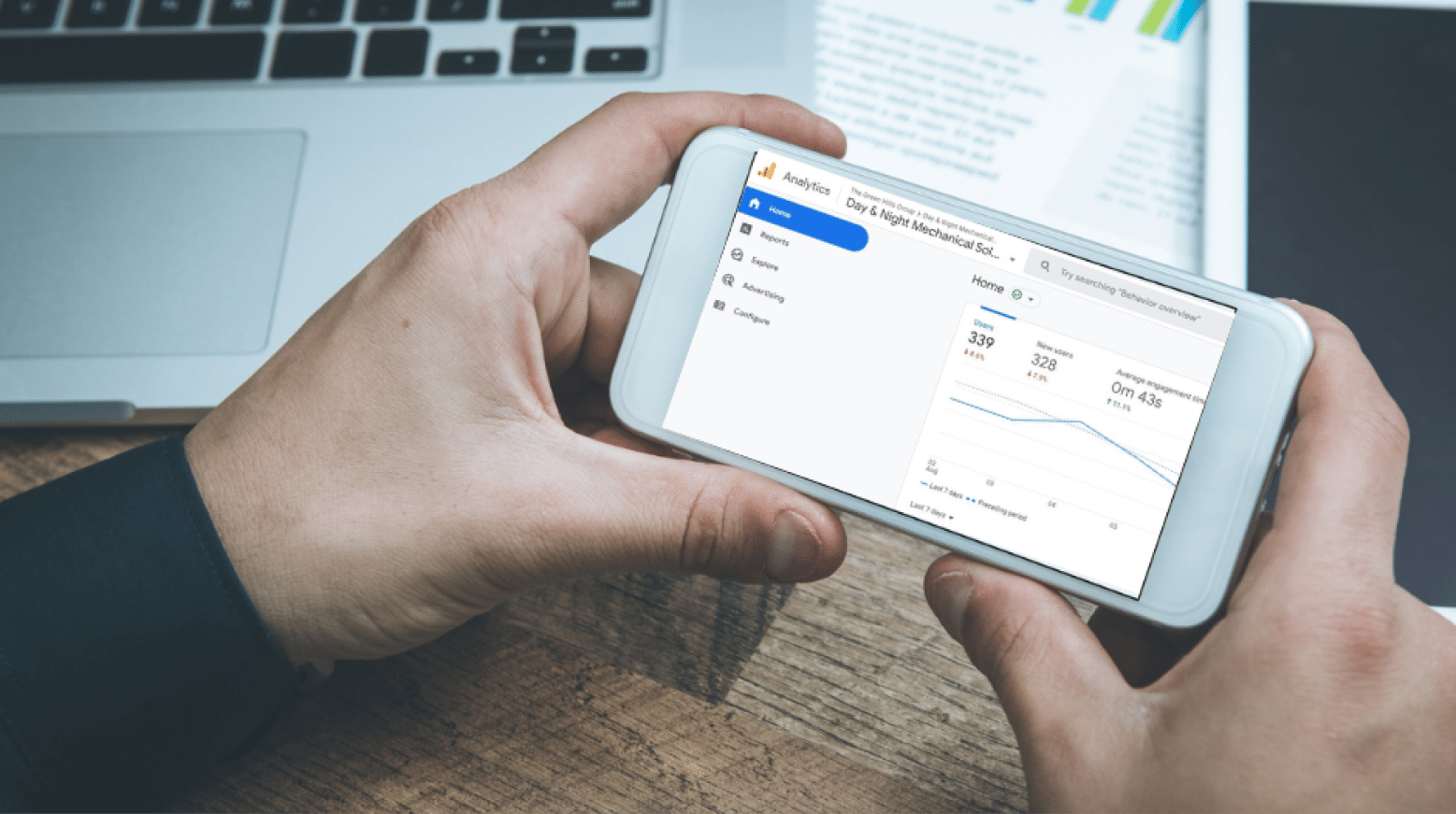What to know, the value it creates, and how to implement it
Tracking website traffic, conversions, user engagement and performance are critical functions marketers and business owners rely on from Google Analytics UA (Universal Analytics). Google’s recent announcement that UA is sunsetting in July 2023 and transitioning to Google Analytics 4 is challenging the status quo, leaving many professionals anxious about what this change could mean.
Enter Google Analytics 4 (GA4), a new analytics service that measures traffic and engagement across websites and apps. GA4 will vastly improve data collection, conversion tracking (or lead tracking) and help guide business owners and marketers to make better informed business decisions from these results.
Read on to learn about GA4 and the transition to event-based tracking, the value it creates for business owners and marketers, how to implement GA4, and when to prepare your rollout strategy.
Cookies? No, Thank You
Cookies are used to track website visitors by collecting user data, helping marketers better understand and target their audiences. However, the “cookie-less” movement for consumer privacy and data protection prompted a transformation in the online world, making it more challenging to track a user as they enter and exit multiple platforms from multiple devices.
The topic of moving towards a privacy-centric world is swirling with marketers, developers and business experts alike. This is due to tech giants blocking third-party cookies from tracking you online. For example, Apple’s iOS privacy update in 2021 sent shock waves through the advertising world and changed how advertisers are able to track user behavior because of its elimination of cookie tracking.
Not to mention, Google has joined the club, (sort of) as cookies are not entirely going away with GA4. Google states that they plan to eliminate third-party cookies on its browsers but first-party cookies that track your website data will still be here.
Google made many changes when it comes to how GA4 works, but one of the most consequential was the decision not to rely on cookies for tracking data.
What We Know About GA4
It’s important to know that GA4 is not an upgrade to Universal Analytics. It is a completely new default system for tracking website and app metrics. The new GA4 decreases this dependence on cookies to document certain events across platforms by utilizing machine learning to fill in the blanks when user consent is not given for tracking. The new system is sunsetting session-based tracking and transitioning to user and event-based tracking.
The value of machine learning is huge; predictive insights allow marketers and business owners to learn more about user behavior and conversions/leads, creating critical insights that will improve marketing activities. More robust data will better inform overall marketing decisions, leading to more profitable ROI.
Get greater value from your data
Machine learning generates sophisticated predictive insights about user behavior and conversions, creates new audiences of users likely to purchase or churn and automatically surfaces critical insights to improve your marketing.
While major changes seem daunting, there are positive takeaways from GA4. When UA was developed in 2013, online privacy regulations were nowhere near where they are today. GA4 uses the latest in machine learning and statistical data to deliver greater data-driven insights. The biggest impacts of the new GA4 system include:
- Performance dashboards in UA are no longer available come July 2023: The shift towards user and event-based tracking is changing which metrics can be tracked. In addition, you cannot carry over historical data from your UA account. You can still access historical data via UA, but you will have to toggle back and forth between UA and GA4 to fill in the blanks.
- Data-Driven Attribution: Analyze the business impact of your marketing efforts across the customer journey, from before they visited your website to their last touch point. GA4 assigns attribution credit to better understand how marketing activities impact your conversions and leads. With the ability to export this data to Google Ads, marketers are able to maximize the effectiveness of campaigns while business owners can enjoy an improved ROI.
- New metrics to track: Metrics such as sessions, bounce rates and goals might go away, but new holistic metrics, such as Customer Lifecycle reports — Acquisition, Engagement, Monetization, and Retention, will be introduced. Plus, you can expect the ability to track engaged sessions, engaged sessions per user, engagement rate and engagement time. An engaged session is a session that lasts for at least 10 seconds, has at least one conversion event, or involves at least two page views.
- New customized reporting interface: In the past, reporting dashboards in UA contained pre-built dashboards for each account. Now, many of the reports that you access will be sunsetted; GA4 reporting will only be generated after you begin tracking events. This makes reporting more valuable and customized to the business objectives that matter most.
- Enhanced conversion tracking: Previously in GA4, we could only track a maximum of 20 goals, but GA4 allows up to 30. Now, an event is considered a conversion (not a goal) and you are in charge of defining what those are for your business. Pre-defined conversions in GA4 include first open (for apps), app store subscription convert (for apps), in-app purchase (for apps) and purchase (for web and app).
- Tracked audiences: Advertisers will be able to create audience lists in GA4 which can be linked to Google AdWords. This should increase ad personalization and targeting effectiveness. Additionally, you can segment audiences by dimension, metrics, and events to include a varying subset of users.
- Custom event tracking: There are four types of events in GA4: Automatically Collected Events, Enhanced Measurement Events, Recommended Events and Custom Events. Creating custom events is similar to configuring recommended events, but you need to create your own event names, making it highly tailored to your business goals and tracking needs. There are many ways to use events in GA4, it just comes down to your business objectives, audience, your objectives, and the type of reporting and analysis you want to perform.
- A comprehensive view of user activity: Moving to user and event-based tracking means we get a holistic view of the user’s journey, enabling multi-touch attribution across the web and apps.
When Should We Make the Switch?
We recommend prioritizing this in your organization since it will likely be a rollout that requires a deep understanding of the new GA4 platform to ensure a successful implementation. Marketers need to immerse themselves in how to leverage this new tool, developers need to understand how to implement it across their organization, and leadership will need to develop a strategy for its release.
For successfully tracking year-over-year data, the transition to GA4 should begin in July 2022, otherwise, the data will not be available. To begin, we recommend setting up a GA4 property alongside your existing UA property as soon as possible. Google’s GA4 Setup Assistant is a great resource to start the process. The sooner you start, the sooner you can begin tracking critical data and get more comfortable using the GA4 system.
What’s Next for GA4
Although there is much to learn about this analytics system, the first step to getting started is creating your new GA4 property.
While it may take some time to get acclimated to the new GA4, there are many advances to be excited about. The new GA4 delivers better analytics insights to inform your marketing decisions by helping business owners track ROI, conversions and ultimately make better decisions based on improved data that can lead to business growth.
If you need help transitioning to the new GA4 platform, we are here to help! Please contact us today.





